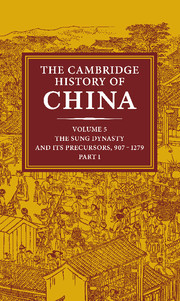Book contents
- Frontmatter
- Introduction: the Sung Dynasty and Its Precursors, 907–1279
- 1 The Five Dynasties
- 2 The Southern Kingdoms between the T’ang and the Sung, 907–979
- 3 Founding and Consolidation of the Sung Dynasty under T’ai-tsu (960–976), T’ai-tsung (976–997), and Chen-tsung (997–1022)
- 4 The Reigns of Jen-tsung (1022–1063) and Ying-tsung (1063–1067)
- 5 Shen-tsung’s Reign and the New Policies of Wang An-shih, 1067–1085
- 6 Che-tsung’s Reign (1085–1100) and the Age of Faction
- 7 The Reigns of Hui-tsung (1100–1126) and Ch’in-tsung (1126–1127) and the Fall of the Northern Sung
- 8 The Move to the South and the Reign of Kao-tsung (1127–1162)
- 9 The Reign of Hsiao-tsung (1162–1189)
- 10 The Reigns of Kuang-tsung (1189–1194) and Ning-tsung (1194–1224)
- 11 The Reign of Li-tsung (1224–1264)
- 12 The Reign of Tu-tsung (1264–1274) and His Successors to 1279
- Bibliography
- Glossary–Index
- References
9 - The Reign of Hsiao-tsung (1162–1189)
Published online by Cambridge University Press: 28 March 2010
- Frontmatter
- Introduction: the Sung Dynasty and Its Precursors, 907–1279
- 1 The Five Dynasties
- 2 The Southern Kingdoms between the T’ang and the Sung, 907–979
- 3 Founding and Consolidation of the Sung Dynasty under T’ai-tsu (960–976), T’ai-tsung (976–997), and Chen-tsung (997–1022)
- 4 The Reigns of Jen-tsung (1022–1063) and Ying-tsung (1063–1067)
- 5 Shen-tsung’s Reign and the New Policies of Wang An-shih, 1067–1085
- 6 Che-tsung’s Reign (1085–1100) and the Age of Faction
- 7 The Reigns of Hui-tsung (1100–1126) and Ch’in-tsung (1126–1127) and the Fall of the Northern Sung
- 8 The Move to the South and the Reign of Kao-tsung (1127–1162)
- 9 The Reign of Hsiao-tsung (1162–1189)
- 10 The Reigns of Kuang-tsung (1189–1194) and Ning-tsung (1194–1224)
- 11 The Reign of Li-tsung (1224–1264)
- 12 The Reign of Tu-tsung (1264–1274) and His Successors to 1279
- Bibliography
- Glossary–Index
- References
Summary
introduction
Relative to the entire Southern Sung period, Hsiao-tsung’s reign (1162–89) stands out as the most tranquil and prosperous. Inheriting the throne in 1162 at the mature age of thirty-five, Hsiao-tsung proved himself a worthy descendant of T’ai-tsu, the founding Sung emperor. As an able and responsible ruler, Hsiao-tsung consolidated the Southern Sung regime on the foundations laid by his adoptive father, Kao-tsung. Politically, the reign was free from the upheavals and intense power struggles that had characterized his father’s reign. Militarily, the empire became stronger than it had been for some time. After the 1165 treaty was concluded, Hsiao-tsung’s administration maintained peace with Chin in the north. Peace fostered economic recuperation and general prosperity while Hsiao-tsung’s policy of frugal government spending added further to the wealth of his state. As a consequence of his strict administrative control over both central and regional governments, general order and stability prevailed in domestic policies. The period was a time of great intellectual development, noted for the emergence of a large number of learned men in the fields of philosophy, poetry, and classical studies. For these reasons Hsiao-tsung is often singled out as the best of the Southern Sung monarchs, and his reign is depicted as the “golden age” of the Southern Sung dynasty.
- Type
- Chapter
- Information
- The Cambridge History of China , pp. 710 - 755Publisher: Cambridge University PressPrint publication year: 2009
References
- 1
- Cited by



